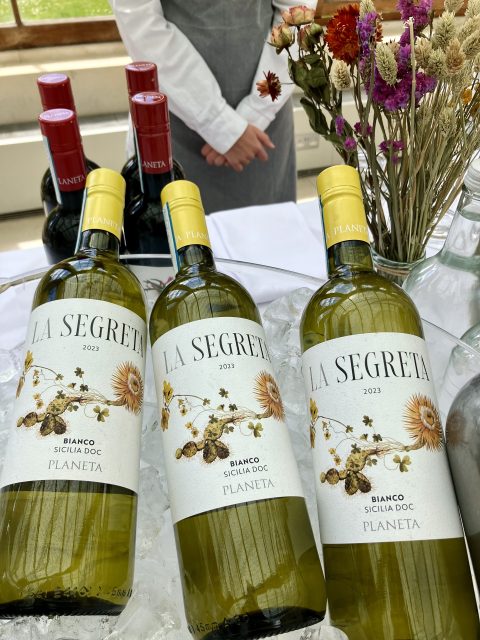This website uses cookies so that we can provide you with the best user experience possible. Cookie information is stored in your browser and performs functions such as recognising you when you return to our website and helping our team to understand which sections of the website you find most interesting and useful.
Planeta pioneers first ever Sicilian wine bottle
Sicilian wine producer Planeta has been fighting to bring glass bottle production to the Italian island for a decade. Now that it has finally arrived, Sarah Neish talks to CEO Alessio Planeta about the carbon and cash savings it brings winemakers.

Alessio Planeta is in his element swirling a glass of wine inside London’s Kew Gardens at an event held yesterday to celebrate the unveiling of a new ‘botanical’ look for the Sicilian company’s La Segreta brand.
Alongside the pretty floral-inspired wine labels, the 2023 vintage of La Segreta’s organic white wines – a 100% Grillo and a Bianco blend – is for the first time housed in a glass bottle that has been manufactured on the island of Sicily.
This might not sound like the hugest of deals, but countless hoops were jumped through in order to pioneer something that had never been done before on the island, and it’s paying off.
The new Sicilian-made bottles are produced from 80% recycled glass, sourced from across the island, and 20% new glass to ensure the bottle has adequate stability.
“People don’t exactly associate Sicily with recycling,” Alessio Planeta, CEO and technical director of the wine company, tells db. “But the project is genius in terms of combatting the rubbish on the streets. We began by collecting recycled glass from a select few villages, and then gradually expanded across the island.”
Italian company Sarco Srl is responsible for collecting the glass waste for recycling, and the scheme offers a completely closed loop economy: the raw material is of Sicilian origin, the bottles are produced in Sicily, sold later to producers on the island, where they are filled with Sicilian wine.

Mountain to climb
The idea has taken the best part of 10 years to get across the line; partly because it took time “to get Sicilian producers to understand it, and to be on the same page,” says Penny Murray, export manager for Planeta. And partly because it proved nearly impossible to find a glass-making company that would agree to manufacture the bottles in Sicily, rather than in their own country of origin.
Then there was the no-small issue of the minimum order requirement needed in order for a glass company to agree to the proposal – “600,000 bottles in one go, and of exactly the same type,” Murray tells the drinks business.
OI-Glass, an American manufacturer with a European arm based in Switzerland, was the firm who stepped up to the plate, agreeing to open a new production site in Sicily in mid-2023, where it initially began making “Burgundy-style” bottles “with a map of Sicily imprinted on the base,” shares Murray, before explaining that the next wave of bottles will be more of a “Bordeaux style.”
The bottles for the white wines are made from green glass and currently weigh just 410g.
While the idea of a Sicilian-made wine bottle began as a joint discussion between Planeta (which produces around 2.5 million bottles of wine per year) and fellow producer Tasca d’almerita (which makes even more wine, around 3.5 million bottles annually), around 20 more Sicily wineries have since signed up to source their bottles through the new operation.
For La Segreta, 2023 is the first vintage to be housed in the new home-made bottles and these wines are filtering through to markets now.
Furthermore, O-I is currently “working on transforming its machinery to be able to make the screwcaps for the bottles,” Murray says.
The switch has proven to be a smart commercial decision, as well as a sustainable one.
Previously, Planeta purchased its glass bottles from either Northern Italy or France, which came with considerable transport costs and associated carbon footprint. Producing bottles at the new site “saves trucking them more than 1,400km – travelling from Marsala to Menfi as opposed to Northern Italy,” Murray says.
As Alesssio Planeta points out, “around 40% of our carbon footprint was glass before.”
The move will result in a 4,056-ton carbon reduction per year across all SOStain associated companies that are using the bottle. And while Alessio Planeta claims that the financial savings he has made since the switch have been “not a lot”, the vastly reduced transport costs must surely have helped his bottom line.
He explains that saving money was not his primary motivation, but instead limiting the damage caused to the planet, so that his biodiverse vineyards can thrive for generations to come.

